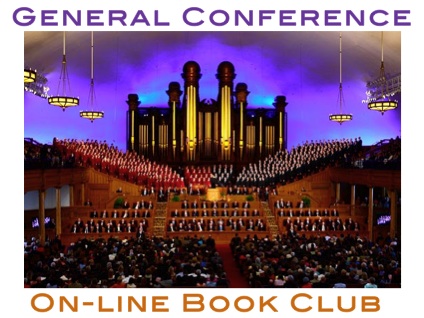I think that my Wednesday feature from the Church Handbook of Instruction, along with Saturday’s Gospel Principles feature, is going to be my “Being Mormon” section of this blog. Both the Gospel Principles book and the Church Handbook of Instruction can explain almost anything that a person could want to know about being Mormon.
(find the handbook here)
Perhaps one of the fundamental truths of the restored gospel is the priesthood. No part of the Church would exist without the priesthood power being restored. The key part of the actual gospel in the atonement of our Savior, Jesus Christ, but the key part of the functioning of the gospel, and the administration of the gospel is the priesthood authority.
Christ Himself administered His Church in His time under the direction of God the Father. Before that, Christ’s people, the Israelites, administered His Church through the power of the priesthood. And now, in this day, the Latter-day Saints (Mormons) administer His Church through the restored power of the priesthood. “The priesthood is the power and authority of God. It has always existed and will continue to exist without end.”
The priesthood power is conferred by the Savior, Jesus Christ, but it is in fact the power of God. “Through the priesthood, God created and governs the heavens and the earth. Through this power, He exalts His obedient children, bringing to pass ‘the immortality and eternal life of man’” The Father is the orchestrator of this life, the one preceding it, and the next life. Christ is His Son, just as we are His sons and daughters. So the power of the priesthood is the power and authority to act in God’s name. But since Jesus Christ and the Father are one, we sometimes talk of the priesthood as being able to do what Christ would do if he were here on the earth.
“The blessings of the priesthood are available to all who receive the gospel.” All who want the blessings of the priesthood have to accept the gospel. The gospel and the priesthood were both restored in these latter days by the prophet Joseph Smith. The blessings of the priesthood come through ordinances and covenants.
There are two parts to the Priesthood. The first is the preparatory, Aaronic Priesthood. “Those who hold the Aaronic Priesthood may be authorized to administer the ‘outward ordinances’ of baptism and the sacrament.” And the second is the greater, or Melchizedek Priesthood. “The Melchizedek Priesthood is the higher or greater priesthood. It is present and functional whenever the Church of Jesus Christ is upon the earth in its fullness.” “Through the authority of the Melchizedek Priesthood, Church leaders guide the Church, direct the preaching of the gospel throughout the world, and administer all the spiritual work of the Church.”
Young men are ordained to the Aaronic Priesthood when they turn twelve. At that time they are ordained to the office of deacon. At fourteen, they receive the office of teacher, and at sixteen, the office of priest. When they are eighteen and preparing to leave to serve a mission, they receive the office of Elder and are ordained to the Melchizedek Priesthood. From there, the only other office of the Priesthood is High Priest. We’ll talk more about the offices of the Priesthood in a few months.
Priesthood Keys
What we call the “keys” of the priesthood are “the authority God has given to priesthood leaders to direct, control, and govern the use of His priesthood on earth.” How and when and who gets the priesthood is governed by those who hold Priesthood keys. All members of the Church who hold the priesthood have some keys. But most of the keys rest with the presidents of Quorums, including Bishops and the President of the Church. All other keys are given by delegation from one of these High Priests.
“Those who hold priesthood keys have the right to preside over and direct the Church within a jurisdiction.” This “jurisdiction” is very important and significant in the Church. It means that a bishop from Omaha has no priesthood jurisdiction over the member in South Africa. Bishops have jurisdiction over the people who live within their ward boundaries.
“Jesus Christ holds all the keys of the priesthood pertaining to His Church.” He has every key, and all the authority to govern in any jurisdiction. Which only makes sense, since He is the head of the Church anyway.
“The senior living Apostle, the President of the Church, is the only person on earth authorized to exercise all priesthood keys.” The president of the Church also has jurisdiction over every part of the world. The problem with that is that the president is human and cannot be everywhere at once. So the president calls Area Authorities, members of the Quorum of the Seventy, to preside over different areas of the world. (you can learn more about the Seventy here – this link is the first of a three part series about the Seventy) “Seventies act by assignment and by the delegation of authority from the First Presidency and Quorum of the Twelve Apostles.”
The President also delegates priesthood keys to others to perform ordinances and work that no one man could ever do alone. “Priesthood keys are bestowed on presidents of temples, missions, stakes, and districts; bishops; branch presidents; and quorum presidents. This presiding authority is valid only for the designated responsibilities and within the geographic jurisdiction of each leader’s calling. When priesthood leaders are released from their callings, they no longer hold the associated keys.”
Counselors in presidencies do not receive keys, and neither do presidents of Sunday School, Primary, Young Men, Young Women, etc. Those presidents and counselors act under the delegation of the Bishop, Branch President, or Stake President who called them.
Ordinances
“Priesthood authority is required to perform the ordinances of the gospel.” The purpose of the Church of Jesus Christ of Latter-day Saints is to provide the organization and authority “to administer the ordinances of salvation and exaltation.” It is through the priesthood authority that these ordinances are performed. If you are unfamiliar with what “ordinance” means, “An ordinance is a sacred physical act with symbolic meaning.” Ordinances are accompanied by covenants. For example, the ordinance of baptism comes with a covenant that we will take upon ourselves the name of Christ and stand as a witness of Him “at all times, and in all things, and in all places” as well as bear each other’s burdens and comfort those who need comforting – basically, that we will help each other out and love each other.
Ordinances are symbolic, and “The symbolism helps the participants remember the Father’s love, the Son’s Atonement, and the Holy Ghost’s influence.” For example, the ordinance of baptism is symbolic of the death, burial, and resurrection of our Savior into a perfect being. When we are baptized, we are completely buried under the water, and when we are brought out of the water, we become spiritually “clean” – perfect, as our sins are washed away. Each week when we take the sacrament (which is symbolic of the atonement of our Savior – that He gave His body and His blood) our baptismal covenants are renewed.
“Some ordinances are required for exaltation in the celestial kingdom for all accountable persons. These ordinances include baptism, confirmation, Melchizedek Priesthood ordination (for men), the temple endowment, and temple sealing.”
Covenants
What exactly is a covenant? “A covenant is a sacred and enduring promise between God and His children. God gives the conditions for the covenant, and His children agree to comply with those conditions. God promises blessings that are conditional on the person faithfully fulfilling the covenant.”
As we make and keep these sacred covenants and receive the ordinances that are connected with the covenants, we will be “greatly blessed in mortality and become eligible for exaltation.”
I am so grateful for the restoration of the gospel, and for the priesthood power on the earth. Even though Christ does not walk the earth today, His power is still here, and can be found in the Church of Jesus Christ of Latter-day Saints.
Are you grateful for the priesthood power? What are your thoughts on ordinances and covenants?
PS – This is the 100th post on My Soul Delighteth, and in honor of this momentous occasion, I am going to be having a giveaway! It will begin this weekend, so check back on Saturday for information about my first giveaway ever!



 So I decided to do a little more research on LDS.org about the Sabbath, and I found a few really helpful articles. The first was an article by President Spencer W. Kimball,
So I decided to do a little more research on LDS.org about the Sabbath, and I found a few really helpful articles. The first was an article by President Spencer W. Kimball, 









